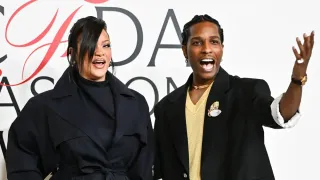
Aug 4
Laverne Cox Leads First-Ever All-Transgender Team on ‘Celebrity Family Feud,’ Marking Television History
READ TIME: 3 MIN.
On July 31, 2025, television audiences across the United States witnessed a groundbreaking moment as Laverne Cox led the first-ever all-transgender team on ABC’s “Celebrity Family Feud.” The episode, which aired in primetime, featured Cox alongside renowned transgender icons TS Madison, Mila Jam, Joslyn De Freece, and Miss Peppermint, forming a team that championed both visibility and unity for transgender people in mainstream media .
While “Celebrity Family Feud” has long been celebrated for bringing together celebrities for lighthearted competition and charity, this episode stood out for its historic significance. Team Laverne’s participation is widely recognized as a powerful affirmation of transgender inclusion on one of America’s most beloved game shows .
Leading the charge was Laverne Cox, an Emmy-nominated actress, producer, and outspoken advocate for transgender rights. Her teammates were equally distinguished: TS Madison, a television personality and entrepreneur; Mila Jam, a pop singer and performer; Joslyn De Freece, an actor and activist; and Miss Peppermint, a singer, actress, and drag performer celebrated for her work on “RuPaul’s Drag Race” .
Collectively, these women brought not only star power but also a message of unity, joy, and perseverance. Their team, known as “Team Laverne,” competed with enthusiasm, humor, and a clear sense of purpose—demonstrating that transgender people belong in all aspects of public life, including the traditionally heteronormative space of primetime television .
The significance of Team Laverne’s appearance extends beyond entertainment. For many viewers, particularly those in the LGBTQ+ community, seeing an all-transgender team represented in such a positive, mainstream context was a moment of affirmation and pride. It also provided an opportunity for broader audiences to witness transgender excellence and camaraderie outside of the frequent news cycles focused on discrimination or legislative battles .
Transgender representation in media has long been a subject of discussion among advocates and scholars. While progress has been made in recent years, transgender people—especially transgender women of color—still face significant barriers to visibility and acceptance. Laverne Cox’s leadership, both as a celebrity and as an advocate, has played a crucial role in shifting narratives and expanding opportunities for transgender people in Hollywood and beyond .
The episode was met with widespread celebration on social media, with hashtags such as #TeamLaverne and #TransIsBeautiful trending across platforms. Fans praised the team for their visibility, confidence, and for breaking new ground on national television . LGBTQ+ organizations and public figures also voiced their support, emphasizing the importance of positive representation in the ongoing fight for equality and acceptance.
For many transgender viewers, seeing five transgender women competing together was deeply meaningful. “This isn’t just about a game show—it’s about being seen and celebrated for who we are,” wrote one fan on Instagram, echoing the sentiments of countless others .
The historic “Celebrity Family Feud” episode arrives at a time when conversations around transgender rights and inclusion are increasingly prominent in the United States and globally. While legislative and social challenges persist, moments like Team Laverne’s game show debut offer a powerful counter-narrative—one where transgender people are seen as integral, joyful participants in the fabric of society.
Laverne Cox and her teammates have long used their public platforms to advocate for equity, visibility, and acceptance. Their appearance on “Celebrity Family Feud” is a testament to both their individual achievements and the collective progress of the transgender community.
As the credits rolled, it was clear that Team Laverne’s impact extended far beyond the game itself. By seizing the spotlight on a national stage, they set a new precedent for representation, inspiring audiences and opening doors for future generations of transgender talent.






